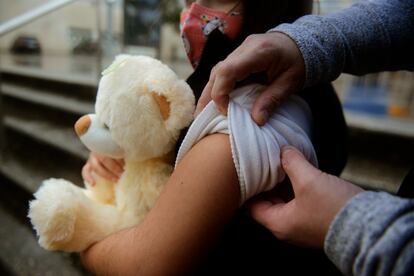Spain’s health officials agree on quarantines for classrooms with five or more positive cases
The recommendation affects early and elementary education; a group with up to four infected students or under 20% of the class would no longer see all students sent home to isolate

Spain’s central and regional health authorities on Friday agreed that entire classrooms will no longer be quarantined in early and elementary education if there are fewer than five positive coronavirus cases in a “bubble group,” a system devised to keep children in stable groups and avoid contact with other classrooms.
“With the goal of preserving in-person education, quarantines for the entire group will be recommended only when there are five or more cases of active infections in the classroom, or over 20% of students are affected, in a period equal to or shorter than seven days,” said the ministry in a statement. “If there are four cases or under 20% of students, these would be considered sporadic cases and quarantining would not be recommended.”
Until now, entire classrooms were being sent home when a case was detected because all members of a bubble group are considered close contacts. In the last week of the semester in December, 1.3% of classes were in quarantine – the worst figure since schools reopened in September 2020 following a national lockdown and months-long closure of all education centers.
On December 31 the Madrid region announced that it was ending full classroom quarantines in early and elementary education, regardless of how many infected students there might be in a class
With some regional officials recently floating the idea of a return to remote schooling due to the fast spread of the omicron variant, teachers’ unions and parents’ associations had backed in-person learning and expressed concern about the difficulties many working parents face when their children are sent home to isolate.
Some regions – which are in charge of their own coronavirus containment measures – had already taken a similar step even before today’s joint meeting of health officials. On December 31 the Madrid region announced that it was ending full classroom quarantines in early and elementary education, regardless of how many infected students there might be in a class. On Monday Andalusia made a similar move but left the final decision in the hands of primary care physicians and school nurses.
On Tuesday, Health Minister Carolina Darias had asked regional governments to wait for the joint meeting on Wednesday before making unilateral decisions.
In secondary school, vocational training and baccalaureate programs, classrooms were never considered bubble groups and only infected students, as well as those sitting closest to them, are being isolated. In any case infections among the over-12 population have dropped significantly as 90.8% of students in these programs have already been vaccinated.
The Health Ministry estimates that by early February around 70% of children between five and 11 years of age, who began getting their shots on December 15, will have at least one dose of a Covid-19 vaccine. This is expected to bring down transmission levels, as children are the only age group that remains widely unvaccinated in Spain.
Tu suscripción se está usando en otro dispositivo
¿Quieres añadir otro usuario a tu suscripción?
Si continúas leyendo en este dispositivo, no se podrá leer en el otro.
FlechaTu suscripción se está usando en otro dispositivo y solo puedes acceder a EL PAÍS desde un dispositivo a la vez.
Si quieres compartir tu cuenta, cambia tu suscripción a la modalidad Premium, así podrás añadir otro usuario. Cada uno accederá con su propia cuenta de email, lo que os permitirá personalizar vuestra experiencia en EL PAÍS.
¿Tienes una suscripción de empresa? Accede aquí para contratar más cuentas.
En el caso de no saber quién está usando tu cuenta, te recomendamos cambiar tu contraseña aquí.
Si decides continuar compartiendo tu cuenta, este mensaje se mostrará en tu dispositivo y en el de la otra persona que está usando tu cuenta de forma indefinida, afectando a tu experiencia de lectura. Puedes consultar aquí los términos y condiciones de la suscripción digital.









































